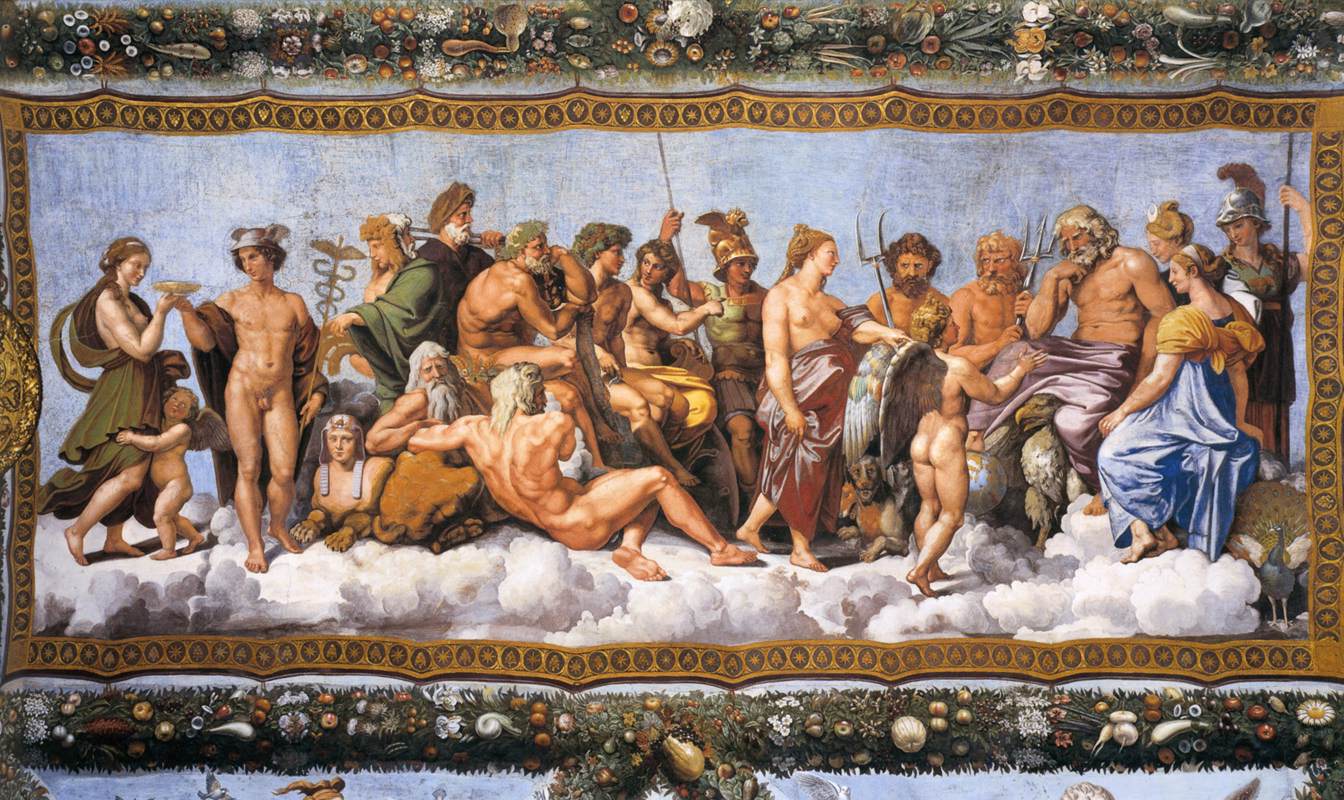Pantheacon, a sort of ‘gathering of the tribes,’ is a place where one can get a sense of the modern, American, neo-Pagan zeitgeist. Yes, the blogosphere also helps with this, but it’s the conversations that go on after the panels are over, the ones occurring in hospitality suites and hallways, that alert careful listeners to the conversations we’re not having as a community. This year there were two panels that aimed to address some of this: Pagans & Privilege, moderated by T Thorn Coyle, and Pagans & Wiccanate Privilege. I did not attend either. It wasn’t for lack of interest, but my pregnant self needed to nap quite frequently.
I would like to wade into the discussions and encourage us, as interlinked communities (which is how I view Large Tent Paganism), to start having the difficult conversations. Ultimately, I don’t think we’re really debating who (or what) is a Pagan or who is a true polytheist. I think we’re debating what and where our communities are headed. To do this we need to start talking about various aspects of privilege.
We can debate what privilege is, who has it and why until we’re blue in the face. I am writing from the assumption that various aspects of self – some we choose, some we don’t – provide us with more or less status and power within the overculture. -Isms are real.
Let me fling disclaimers left and right: I do not think I am the best person or the most well-equipped person to write about these topics. I do not think there are any ‘right’ answers. I think that without facing our own assumptions, personally and communally, I will continue to hear hospitality suite confessions – I mean, discussions – on these topics. And, boy, do people feel passionate, conflicted and confused about these topics!
To start with, I’d like to face what I see as the most difficult topic first: Money.
In my experience, much of the Pagan world is middle to working class. Many are living at or near the poverty-level. But the 1% is not, to my knowledge, represented in our community – and if they are, they ain’t slumming it at the DoubleTree. There are a lot of heavy critiques that can be laid against the class system and the, in my mind, absurd way we break incomes into various categories. Like the nuclear family, I find ‘the middle class’ to be a convenient and misleading lie. And yet, some of us are more financially secure than others.
We need to dig deep and explore our own biases around money, poverty, and wealth. Do our gods care? My opinion is that our gods don’t care how much money we have, they want to know what we’re doing with it. Why is it that the only time money is discussed at Pagan gatherings it is usually in the form of ’10 Spells for Prosperity’? I have a sneaking suspicion that we all want more money, more of the access to forms of power and ease that it can bring, yet as a community and as individuals we’re conflicted. We don’t want to compromise our values and ‘give in’ to corrupt, over-culture values to get it.
However, conflict has been occurring when those values run up against wider expressions of those same values – for example, trans* acceptance in women’s or men’s mysteries. When we are free to be women, what does that mean? Who gets to be a woman? What is appropriate for public ritual space vs private practice? These are also questions of privilege, inclusion vs exclusion.
Exclusion is sometimes appropriate. At a Feri initiation it would be inappropriate to have anyone other than other Feri present. I’m guessing other traditions have similar boundaries and times of exclusion. But public forms of exclusion are usually a form of ‘Othering.’
Not until a sunny day in the forests of the Santa Cruz area, during a weekend Feri training, did I realize these questions of inclusion and exclusion were also occurring around the issue of money. We were working on the earth element. Stability, material wealth, security, money – these are some of the things often associated with the earth element. For part of our discussion series our fearless leader had us address the topic of money. We were going around in a circle talking about what money meant to us, our feelings, fears, and desires. Most people talked about how hard it is makes ends meet in the San Francisco Bay Area, their struggles, their debt, etc. But the conversation began to make a turn – from personal experience to one about ‘those people.’ ‘Those people’ being the wealthy. ‘Those people’ who hired housekeepers, who drove fancy cars, who had no problem paying their taxes or traveling abroad for birthday trips or whatever it is upper middle class and wealthy people do. ‘Those people’ were spoken of as if they were – gasp – on the same plane as Republicans (oh, may the heavens help you if you are a Republican in Berkeley!). Eventually one member of our class, a kind gentleman who flew in from another state for our classes, a man who worked as a highly trained scientist or engineer (I can’t remember which) spoke up.
“Do you realize that you’re speaking about me? I make a lot of money for what I do. My wife and I have a housekeeper, so that we can have more time together and have more time for community events. I give to charity. I support my community.”
Our circle had just Othered one of our own. By finding solidarity through Othering among friends who also struggle, we had just alienated our classmate, our friend. There was a sort of glorification of near-poverty level living and a bitterness at how hard it was to make ends meet. So if it’s bitter work, why do we glorify it and why do we tear down people who aren’t struggling in this way? There is nothing glorious about being poor. Who likes not being able to pay their bills?

Nice things are nice. Eating good food, exploring this amazing world of ours, hearing and seeing live shows, buying exquisite books, wearing clothes that fit, access to quality health care – I would like to do more of these things! I would like to support the work of artists and writers in our communities. Among us are metal workers, healers, medicine makers, jewelry makers, tattoo artists, visual artists, musicians, writers, wood workers, weavers, farmers, bee keepers: I want to support your work! I want to support local, independent, and community causes. But I need money to do so.Money itself is not the problem. Money is a tool. Yes, there are many ways we can support each other that aren’t monetary: we can barter, we can cross-promote, we can provide tangible forms of support in times of crisis or need. But mostly? We need to pay our rents, buy our food and gas, and pay off our student loans with money.
My own family walks a fine line financially. We’re self-employed, which means we have a lot of flexibility in how we organize the hours of our day – perfect for raising a family. Being self-employed also means that finding and affording health insurance has been especially hellish. Our children qualify for medicaid, but my husband and I don’t. Trying to find a pediatrician that will accept medicaid has been difficult, time consuming, and rather insulting. Most places won’t take new patients on this form of insurance. My knee-jerk reaction is “But we’re not poor! How dare you reject me!” Hello privilege check. While my husband and I face certain obstacles by doing our best to opt out of certain accepted middle-class practices, we are privileged in that we can opt out at all. Our skills, education, and yes, family safety net, allow us to pursue a life on the margins (in spite of looking very mainstream), one that I call radical homemaking.
Some people don’t see how all of our choices are intertwined and the various levels of sacrifice that may or may not be required. I lost a friend over my inability to afford health insurance. She insisted that with children it was irresponsible not to have insurance (even though we’d only moved back to the US only 6 months before) and we just needed to suck it up and find a job outside our home. But do so would require us to have a second car (expensive and not in line with our environmental values), possibly put the children in child care (extra expenses), spend less time together (a choice that we value), and incur commuting costs and stress for one, if not both, of us, among other consequences. We would actually both need to work, compromising our spiritual practices, family life, health and environmental values – all for one bureaucratic benefit: health insurance.
A month after this friend and I agreed to part ways, my family found mediocre insurance we could (barely) afford. The conversation with this friend highlighted for me the privileges my family had in opting out of several middle class assumptions of how life should be lived, and the sacrifices and hits we had to take live lives aligned as a greater whole.
It is HARD WORK for a person to find a way to pay bills that is in alignment with our values. It is HARD WORK and damn near impossible to walk the talk in every single arena of life. There is a level of privilege in assuming that all of us can even do so. As I said in my Maxim Monday post on acquiring goods justly, if we’re worried about even affording shoes for our children, seeking out the most fair-trade, environmentally sound shoe isn’t an option.
My own experiences and the conversations I had at PCon lead me to a very specific question: How can we as a community stop Othering each other? Either rich or poor? Pagans joke about how cheap we are. Yet many of us are donating to a vast array of charities and causes. Many people don’t have the money, but have the time to give. Can we support one another in our various struggles? Can we encourage each other to find solutions, jobs, networking, whatever it may be that are in alignment with our values? Can we do these things without judging each other?
How can we build structures of support that will allow and encourage us to grow financially in ways that are nourishing personally and communally? We all have various forms of privilege. How can we use our privileges to support one another, rather than to exclude or alienate?
I don’t have the answers. But I do know that it isn’t found in calling anyone ‘those people.’















